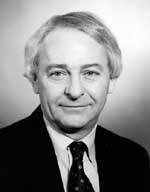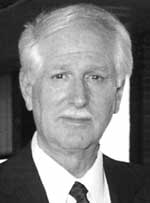Gerald Dunn
Former regent Gerald “Gerry” Dunn died March 22 in Garden City, Mich., after a brief illness. He was 70. Dunn served the University for 16 years and continued as a loyal contributor and fan.

Regent Emeritus Deane Baker, a Republican, remembers the laughs he and Dunn, a Democrat, had about their differences. “We were on different sides of the political fence,” Baker said, “but that didn’t diminish my respect for him. Gerry was a significant contributor to the University and served it well, expanding our presence in both Lansing and Washington, D.C.”
The one-time high school teacher, U.S. Army veteran and Saginaw native was elected regent in 1968, a post he held until 1984. Regent Emeritus Tom Roach, who served with Dunn, remembers his colleague as one who frequently argued the liberal side of an issue but who would vote with the majority when a unanimous action would benefit the institution.
“He was a great U-M football fan, too,” Roach said. “His tailgate parties were widely known.”
Regent Libby Maynard also remembers Dunn as a fan of the University in all aspects. “He was so dedicated to Michigan,” she said. “He was very loyal, well after serving on the board. He always came to the football games—not just for the game, but to be there and to be a part of the University. It’s the one place I knew I would always see him.”
Former regent Phil Power also remembers Dunn as a valued member of the University community. “I did not have the pleasure of serving with Gerry during my time on the Board of Regents, but he sat right in front of me at Michigan football games and he was a delight. He would allocate coaching duties for each quarter to each of us, distributing praise when our ‘coaching’ was successful and blame when it was not so good. He was as astute about the intricacies of football as he was about the political process of resource allocation in Lansing.
“He was a passionate supporter of the University and a good and warm man to all who had the good fortune to know him. For me and my family, U-M football games will never be the same,” Power said.
Among his actions as regent, Dunn introduced the resolution that led to the 1983 divestiture of holdings in companies doing business in South Africa to protest apartheid.
Dunn advocated greater federal and state government funding for the University. “Tuition rates are entirely too high and they must come down, while at the same time the board must continue its commitment to keeping the University of Michigan truly one of the great universities of the world,” he said in 1976.
In his failed 1984 bid for re-election to the board, Dunn encouraged continuing U-M’s commitment to enrolling and graduating more women and minority students. “The University has been and is committed to helping persons receive a good quality education,” he wrote, “in order that they, too, may be a part of the mainstream of American life.”
Dunn’s career emphasized his interest in and concern for education. While representing Flint in the Michigan State Senate, he served as chairman of the Senate Education Committee and vice chairman of the Senate Health and Welfare Committee, along with holding membership on a number of other Senate committees. Dunn also served as a board member of the Michigan Congress of PTAs and was a member of the Michigan Association of School Administrators and the Michigan Association of School Business Officials. He also worked as a lobbyist for several Wayne County schools.
Upon leaving the board in 1984, his fellow regents wrote, “Regent Dunn’s contributions to education in this state are unparalleled. His career as teacher, state senator, and now as representative of several school boards in Western Wayne County has resulted in significant advances for public education at the elementary and secondary levels. And, of course, he completes the circle through his service on this board and his membership on the Higher Education Assistance Authority. Few have demonstrated such a remarkable capacity to contribute so well to the entire educational community.”
Dunn is survived by his wife, Marilyn, his four children and four step-children, nine grandchildren, and several nieces and nephews.
Dunn requested that his body be donated to the Medical School Department of Anatomy. No services are scheduled at this time. Private graveside services will be in Williamston, Mich.
Donations may be made to the Champions for Children Campaign at C.S. Mott Children’s Hospital, 301 E. Liberty St., Suite 400, Ann Arbor, MI 48104.
Dr. Charles Kelsey
Dr. Charles Kelsey, known throughout the School of Dentistry as its historian, died March 20. He was 70.

Born in Wellsville, N.Y., in October 1934, Kelsey earned three degrees from U-M—a bachelor’s degree in 1956, a dental degree in 1964, and a master’s degree in prosthodontics in 1967. After earning his bachelor’s degree, he attended the U.S. Navy’s Officer Candidate School in Newport, R.I., and returned to Michigan following his tour of duty.
Shortly after earning his dental degree, Kelsey joined the faculty in 1964 as a clinical instructor. In 1967, he became an assistant professor; six years later, a full professor.
During a career that spanned 35 years, Kelsey was editor of the school’s Alumni Bulletin from 1970-80. He also produced more than 25 videos on dentures and occlusion in the school’s television studios. For many, his most memorable piece was a 30-minute video he produced and narrated in 1975 that focused on the school’s 100-year history.
His literary interests transcended dentistry.
As a long-time Samuel Clemens aficionado, Kelsey’s study contained an extensive collection of rare books, pamphlets and artifacts that focused on what he called “the country’s greatest literary genius, Mark Twain.” He also was interested in the Civil War and Lincoln’s assassination.
Kelsey was a charter fellow of the American College of Prosthodontics and a leader in teaching and clinical activities at the predoctoral and graduate levels, and in continuing education programs. His commitment to teaching was rewarded on five occasions when he was voted Teacher of the Year.
In a spring 1994 interview in the school’s alumni magazine, DentalUM, he said, “I feel very fortunate that my career has allowed me to participate in a wide range of interesting and rewarding experiences—whether I’m helping a first-year student in the preclinical lab, or working with a graduate student involved in a difficult clinical situation. I enjoy what I do very much.”
Kelsey served on numerous dental school committees, including two terms on its executive committee. He was a member of the University’s Senate Assembly—serving as its secretary—and was appointed to the Senate Advisory Committee on University Affairs, and the Library Council.
He also was an integral part of the school’s Gordon H. Sindecuse Museum of Dentistry Committee during its development.
Survivors include his wife, Jean; daughter, Michele Bates, of Oxford, Ohio; son, John, of Deerfield, Ill.; two brothers and two grandchildren.—Submitted by Jerry Mastey, School of Dentistry

